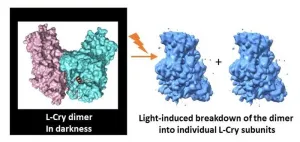Evolution of taste: Sharks were already able to perceive bitter substances
2023-11-13
(Press-News.org)
A research team from the University of Cologne, in collaboration with colleagues from the Leibniz Institute for Food Systems Biology in Freising, has discovered a receptor for bitter taste in twelve different cartilaginous fish (sharks and rays). The receptor belongs to the so-called taste receptors type 2 (T2R), which also make humans perceive bitter and potentially toxic foods. Until now, it was assumed that such receptors only occur in bony vertebrates. The work was published under the title ‘A singular shark bitter taste receptor provides insights into the evolution of bitter taste perception’ in the renowned journal Proceedings of the National Academy of Sciences (PNAS).
In the past, molecular research has had limited information on sharks, as their genomes are often relatively large. Therefore, sequencing is often more complex and takes longer than with many other animals. However, the techniques are more advanced nowadays, providing ever more information on the gene sequences of many cartilaginous fishes. This enabled the neurobiologists lecturer (Privatdozent) Dr Maik Behrens and Tatjana Lang from the Leibniz Institute for Food Systems Biology and Professor Dr Sigrun Korsching at the Institute of Genetics of the University of Cologne to specifically search for bitter taste receptors in cartilaginous fish.
Twelve out of seventeen cartilaginous fish genomes studied contained genes for the taste receptors type 2, with only one T2R gene present in each species. The researchers named this single gene T2R1. The fact that only a single T2R gene was found suggests that it is the original form of these bitter taste receptors, which was not altered by gene duplication and subsequent different specialization of the resulting receptors.
'These findings give us new insights into the evolution of these receptors: We can look back almost 500 million years on the molecular and functional origin of an entire family of bitter taste receptors. Because that is how old the last common ancestor of cartilage and bony fish is,' says Sigrun Korsching. The authors have also introduced the T2R1 gene of the bamboo shark (C. plagiosum) and the catshark (S. canicula) into immortalized cell lines. The results showed that both sharks can taste bitter substances also perceived by humans, such as colchicine or bile acid. A screening of ninety-four human bitter substances identified eleven substances that could also activate the sharks’ receptors. Some of these eleven substances also activate the bitter taste receptors of the ‘living fossil’ coelacanth (Latimeria chalumnae), an ancient species of bony fish, as the authors have shown in a previous study. Sigrun Korsching summarizes that 'the extent to which this function has been conserved is astonishing, i.e. through the entire evolution of vertebrates.'
END
ELSE PRESS RELEASES FROM THIS DATE:
2023-11-13
To paraphrase Mark Twain, reports of declining phytoplankton in the North Atlantic may have been greatly exaggerated. A prominent 2019 study used ice cores in Antarctica to suggest that marine productivity in the North Atlantic had declined by 10% during the industrial era, with worrying implications that the trend might continue.
But new research led by the University of Washington shows that marine phytoplankton — on which larger organisms throughout the marine ecosystem depend — may be more stable than believed in the North Atlantic. The team’s analysis of an ice core going ...
2023-11-13
People with arthritis who report more negative feelings about how they are aging tend to get less physical activity and perceive themselves as less healthy, according to a new study by researchers at Hospital for Special Surgery (HSS) and Weill Cornell Medicine. However, self-perception of good health explained the effect of negative thinking – providing an opportunity for clinicians to focus on a patient’s outlook on aging as well as their overall health.
“Physical activity is essential for older adults with arthritis, as it can help to reduce pain and stiffness, improve ...
2023-11-13
Researchers at Karolinska Institutet and SciLifeLab in Sweden have combined artificial intelligence (AI) techniques used in satellite imaging and community ecology to interpret large amounts of data from tumour tissue. The method, presented in the journal Nature Communications, could contribute to more personalised treatment of cancer patients.
While recent advances in tumour imaging provide a great insight into the microscopic world of tumours, the challenge is to interpret the huge amount of data generated. With hundreds of molecules being measured simultaneously in tens or hundreds of thousands of cells, it has become difficult for researchers to know what molecules and cells ...
2023-11-13
Media kit
New research suggests that a realistic estimate of additional global forest carbon-storage potential is approximately 226 gigatonnes of carbon—enough to make a meaningful contribution to slowing climate change.
The study, published today in the journal Nature, highlights the critical importance of forest conservation, restoration and sustainable management in moving toward international climate and biodiversity targets. It involved hundreds of scientists around the world, who stress that this potential can be achieved by incentivizing community-driven efforts to promote biodiversity.
Forest ...
2023-11-13
ST. LOUIS, MO, November 13, 2023 — An international research team led by James Umen, PhD, member, Donald Danforth Plant Science Center has made an unexpected discovery of a biased counting mechanism used by the single-celled green alga Chlamydomonas to control cell division. Chlamydomonas cells can grow very large and then divide multiple times in succession. The team found that the number of divisions a mother cell undertakes to restore its daughters to the correct starting size deviates from the mathematical optimum that was assumed to dictate ...
2023-11-13
PARIS, NOV. 13—Representatives from the U.S. Department of Energy’s (DOE) Office of Science and the French Alternative Energies and Atomic Energy Commission (CEA) have signed a “Statement of Interest” to launch what both agencies hope will be a significant collaboration on the Electron-Ion Collider (EIC). The EIC, being built in the U.S. at DOE’s Brookhaven National Laboratory in partnership with DOE’s Thomas Jefferson National Accelerator Facility (Jefferson Lab), will be a unique facility for exploring the building blocks of matter and the strongest force in nature. The agreement continues a long history of cooperation in scientific ...
2023-11-13
SAN DIEGO, CA, NOVEMBER 13, 2023 — Research from Hospital for Special Surgery (HSS) reveals a significant psychological impact related to inflammatory arthritis patients’ efforts to maintain employment while coping with the challenges of their illness. The study, titled “The Psychological Experience of Work for People with Inflammatory Arthritis (IA),” was presented at the American College of Rheumatology (ACR) Convergence 2023 on November 13 in San Diego.
“A large body of research indicates that people with inflammatory arthritis are at increased risk for work disability, which can profoundly affect their lives. ...
2023-11-13
In a recent publication in Nature Communications, a joint research team of Johannes Gutenberg University Mainz (JGU), the University of Cologne, and the University of Oldenburg has presented their findings on the functioning of an atypical cryptochrome protein (Cry). These proteins are found in a variety of organisms, and they are often involved in light-controlled biological processes. The marine bristle worm Platynereis dumerilii, for example, employs a special Cry protein designated L-Cry to distinguish between sunlight and moonlight as well as between different moon phases. This is essential for the worms ...
2023-11-13
Artificial intelligence (AI) is on the rise. Until now, AI applications generally have “black box” character: How AI arrives at its results remains hidden. Prof. Dr. Jürgen Bajorath, a cheminformatics scientist at the University of Bonn, and his team have developed a method that reveals how certain AI applications work in pharmaceutical research. The results are unexpected: the AI programs largely remembered known data and hardly learned specific chemical interactions when predicting drug potency. The results have now been published in Nature Machine Intelligence.
Which drug molecule is most effective? Researchers are feverishly ...
2023-11-13
BINGHAMTON, N.Y. -- Migrant couples who can effectively balance the culture of their homeland while adapting to the dominant culture of their new home are more likely to have a better relationship, according to newly published research from psychologists at Binghamton University, State University of New York.
“When immigrants venture into a new country, they embark on a journey of blending cultures while keeping their roots alive,“ said Binghamton University PhD candidate Quinn Hendershot. “There has been limited research on how their ability to adjust to a new culture while embracing the cultures of their homeland can affect the relationship.”
Hendershot ...
LAST 30 PRESS RELEASES:
[Press-News.org] Evolution of taste: Sharks were already able to perceive bitter substances




